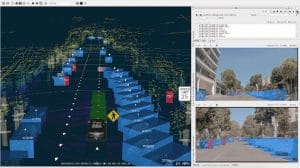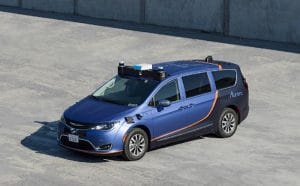
Aurora CEO Chris Urmson 2020 told virtual attendees at MBS 2020 that funding for autonomous vehicle development has been cut substantially this year.
While autonomous vehicles hold great promise, the investment in the technology has shrunk substantially, the CEO and co-founder of a leading AV firm revealed at the Center for Automotive Research’s Management Briefing Seminars this week.
Chris Urmson, a leading researcher in AV technology and the CEO of Pittsburgh-based Aurora, said the investment that was expected to top $40 billion during the next half decade has now shrunk to $20 billion to $25 billion. He noted even that remains at risk in the face of the COVID-19 pandemic, which has forced automakers and other companies with an interest in the technology to re-evaluate their priorities.
But the pandemic also has focused interest in automated vehicles that can carry goods or food and deliver food, opening up new opportunities for automated vehicle technology. Waymo, Alphabet’s self-driving unit where Urmson worked before leaving to organize his own company, recently announced it was planning a program to automate commercial vehicles with Fiat Chrysler Automobiles N.V.
(Hyundai, Kia invest in autonomous vehicle startup Aurora.)

Urmson estimated that of the $40 billion expected to be spent on AI development in the five years will be cut by at least half.
Aurora, in fact, recently acquired a company in Bozeman, Montana that has developed a type of lidar that “sees” more than 300 meters in front of a vehicle. Lidar is considered by nearly all in the industry an essential building block for automated driving and the system developed by Blackmore caught Aurora’s eye because it would be especially helpful in guiding heavy trucks on interstate highways, Urmson said.
Urmson explained that Aurora doesn’t intend to build vehicles. “There are companies that have built vehicles for more than 100 years and are very, very good it.”
Instead Aurora is concentrating on developing the hardware and software needed to create an automated driver. In the future, the company’s emerging business model could be something like that used in the airline industry where the carrier purchases an aircraft from Boeing or Airbus and then specifies which company it wants to supply the engines for the plane.
(Fiat Chrysler teams with autonomous vehicle start-up Aurora.)
Aurora will want customers to specify its system for the vehicles they order.
Urmson added the delays in the development of automated vehicles capable of going anywhere won’t emerge. In fact, automated vehicles already perform very specific tasks in some parts of the world, such as moving travelers through a special fenced in path at Heathrow Airport near London or on special underground road in Dubai.
But he told his virtual audience that the technical challenge of developing fully automated, or Level 5 vehicle is very difficult.
(AV testing miles in California jumped 40% in 2019.)
Urmson also said so-called Level 3 systems that allow the driver to do something else while behind the wheel but turn then the vehicle back over to the driver in critical situations are ill advised and won’t work. Accidents happen in seconds and it is unrealistic to expect a driver to assume control of vehicle and understand the situation if he’s been absorbed in a movie or a book or napping, Urmson noted.

